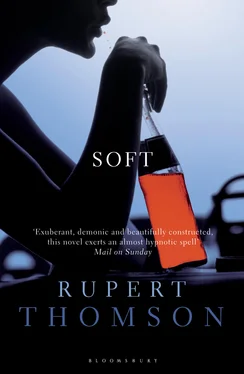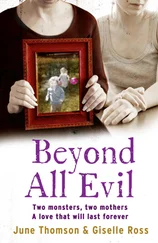He bent close to his battered ghetto-blaster and pushed a tape into the slot. ‘Something new I found,’ he said. ‘Something to cheer us up.’
She asked him what it was.
‘Flamenco.’
He looked at her as if she ought to understand, as if this was something a father and daughter might be expected to have in common. She’d heard the word before, of course, but she had no idea what the music would sound like.
Then it began. An acoustic guitar played very fast, a kind of frantic, rhythmic strumming that was difficult to listen to. She felt as if the inside of her head was made of knitted fabric and somebody with nimble fingers was trying to unravel it. She wondered what flamenco meant in Spanish.
‘Do you like it?’
She twisted her face to one side. ‘Kind of.’
‘You can dance to it. Look.’
And he started to dance. Her father. His arms up near his head. Like candlesticks, she thought. Or antlers. His fingers snapped and clicked in the air beside his ears. She stared at his feet as they stamped on the floor, stamped in time to the guitar.
‘If you were a proper audience,’ he panted, ‘if you were a flamenco audience, you’d be clapping now.’
Clapping? She gazed at him anxiously, confused.
Then he must have slipped on something or tripped over because he toppled sideways suddenly and his elbow caught the edge of the formica table, which splintered loudly, almost happily, and then detached itself from the side-wall of the caravan, bringing their dinner plates with it, the bottle of tomato ketchup, three small cactuses in plastic pots, the radio and a jam-jar bristling with pens. He sat on the floor, blood trickling crookedly from a cut just above his eyebrow.
‘Dad?’
‘I’m all right. I’m all right.’ Eyes almost shut, he shook his head. ‘Those Spaniards,’ he said. ‘They must really get through the furniture.’
That laugh again, high-pitched and wild.
She put an arm round him and helped him struggle to his feet. She thought of deckchairs, how you have to arrange the pieces of wood and cloth in the right shape, otherwise they won’t stand up. Under the whisky her father had a strong vegetable smell. Like tins of soup when you first open them. Before they’re cooked.
He leaned against the wall for a moment, gathering himself, then reached awkwardly into his pocket and pulled out a soiled handkerchief. Each time he dabbed at the blood, he held the handkerchief at arm’s length and studied it. Finally, when the bleeding had slowed down, he turned to her and said he thought a breath of air might do him good.
Outside, they stood on rough clumps of grass and looked up into the sky. A dark night: the moon in hiding, stars masked by clouds that shifted in great pale slabs like fields of ice. The wind lifted Glade’s hair away from her neck, then let it fall back into place. Then lifted it again. After a while she glanced sideways at her father. He was still staring up into the sky, staring hard, as if he believed there was something there to be discovered or received. And, all the time, that Spanish music playing …
‘Not famous for its flamenco, Lancashire,’ he said at last.
Then, shivering a little, they both went back inside.
From the table by the kitchen window Glade watched planes sliding diagonally across the London sky. At night you could easily believe they were just arrangements of lights, optical effects. It seemed strange to think there were hundreds of people up there.
Her raspberry tea stood at her elbow, going cold.
After a while she realised that her focus must have altered because she was no longer aware of the planes. Instead, she could see herself, a reflection in the dim mirror of the glass. Her long blonde hair, her ghostly skin. She noticed her right ear. It stuck out more than the left one, as though she was listening harder on that side of her head. According to her father, she had slept on it when she was young.
Her father.
She wondered what it was like with just a radio for company and nobody except the farmer for at least a mile around. The darkness, the cold. The brown owls swooping through the field. She didn’t mind sleeping in the caravan, though sometimes the walls seemed a bit too thin. They offered no protection. In a caravan your dreams could frighten you.
During the weekend she’d had a nightmare. She must have cried out because, when she opened her eyes, her father was standing above her in his pyjamas. He was holding a candle. Behind his back, his shadow pranced and capered, mocking him. If he turned round, she thought, it would have to stop.
‘Are you all right?’ he said.
She nodded. ‘It was just a dream.’
He reached down, touched her hair. She could feel his hand shaking slightly, tremors underneath the skin, an earthquake taking place inside his body.
‘I’m sorry I woke you.’
‘You didn’t wake me. I was already awake.’ He took his hand away. ‘I miss her, Glade.’
In the candle-light his face was all black hollows and odd polished places. He seemed to be gazing into the far corner of the caravan. Not seeing it, somehow. Not seeing anything. She didn’t know what to say to him. She’d never been much good at comforting people; when they cried in front of her, she usually just stared at them.
‘It’s lovely that you’re here, though. It’s probably why I’m being like this.’
‘I don’t mind,’ she said.
He held her head against his chest for a moment and, just then, he smelled like her father again, not the stranger she had smelled an hour or two before.
‘Oh Glade, what happened?’
Her head against his chest. His heart beating fast.
‘What happened?’
The next day, when she said goodbye to him, he held her tight and spoke into her hair, making her promise to visit him again before too long. With her thin arms circling his waist and her head turned sideways, she seemed, from a distance, to be holding him together. She could see beech trees at the edge of the field, their branches webbed with mist. One bird called from somewhere behind her, its song thin and wistful in the morning air. She felt his reluctance to let her go.
He waved as she walked away across the grass and he was still waving when she reached the five-bar gate at the bottom of the field — though, by then, his face had shrunk to almost nothing, becoming featureless and pale, the colour of a fruit or vegetable when it’s been peeled, when it has lost its skin.
That winter the weather stayed cold, the sky over London opaque and grey; the trees looked scratchy, a tangle of random pencil marks, like the pictures children bring home from school. March came, and nothing changed. If you had asked Glade what she had been doing, she would probably have shrugged and said, ‘Not much.’ She was still working at the restaurant — in fact, she was working harder than ever: Hector had broken his leg in a motor-bike accident, and she had agreed to cover for him. Once or twice, during those months, she dreamed about the mountain in Paddington, her dreams set in the past, among people she no longer knew. Then, on her birthday, Charlie Moore gave her an old black-and-white print of Mount Fuji. Things seemed to be accumulating, fitting together. Like evidence. For the first time in almost eighteen months she began to draw. The subject was always the same: the mountain, the wasteground. Some of her efforts were openly nostalgic, simple recreations of a reality that had once delighted her. Others were less emotional, more abstract — compositions that depended on the careful balancing of triangles and straight lines. In the afternoons, during the gap between shifts, you could often find her sitting in a café on Old Compton Street with her head bent over a sketch-book. When she got home at two or three in the morning she would carry on, sometimes until dawn, her red curtains closed against the daylight. The drawings didn’t satisfy her, though. She felt there was something missing. She didn’t know quite what it was.
Читать дальше












